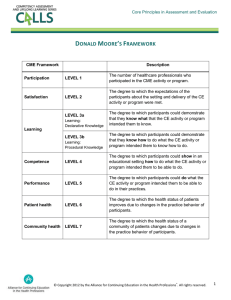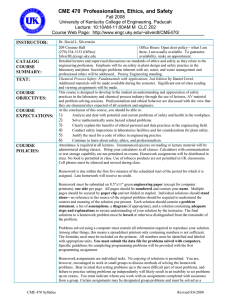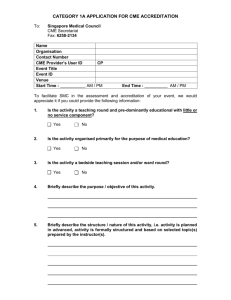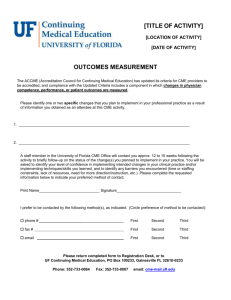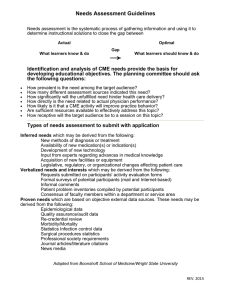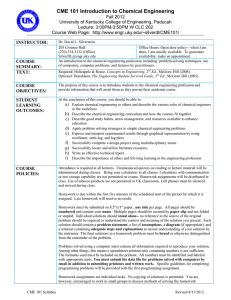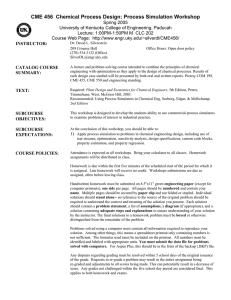CME 455 Chemical Engineering Process Design I
advertisement
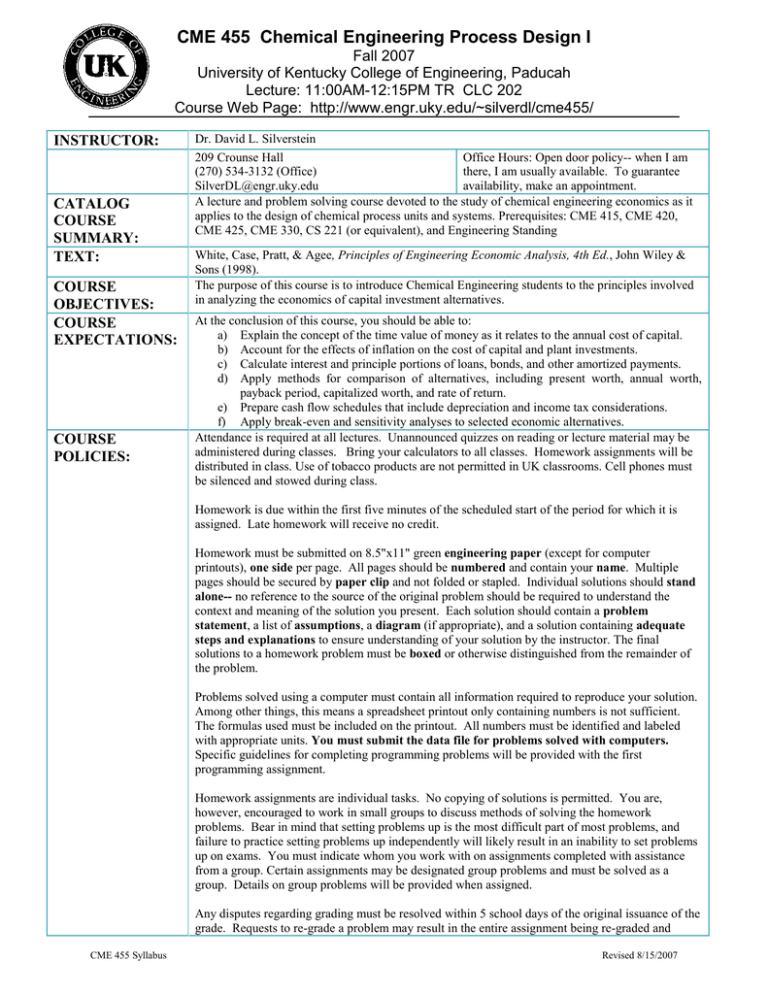
CME 455 Chemical Engineering Process Design I Fall 2007 University of Kentucky College of Engineering, Paducah Lecture: 11:00AM-12:15PM TR CLC 202 Course Web Page: http://www.engr.uky.edu/~silverdl/cme455/ INSTRUCTOR: CATALOG COURSE SUMMARY: TEXT: COURSE OBJECTIVES: COURSE EXPECTATIONS: COURSE POLICIES: Dr. David L. Silverstein 209 Crounse Hall Office Hours: Open door policy-- when I am (270) 534-3132 (Office) there, I am usually available. To guarantee SilverDL@engr.uky.edu availability, make an appointment. A lecture and problem solving course devoted to the study of chemical engineering economics as it applies to the design of chemical process units and systems. Prerequisites: CME 415, CME 420, CME 425, CME 330, CS 221 (or equivalent), and Engineering Standing White, Case, Pratt, & Agee, Principles of Engineering Economic Analysis, 4th Ed., John Wiley & Sons (1998). The purpose of this course is to introduce Chemical Engineering students to the principles involved in analyzing the economics of capital investment alternatives. At the conclusion of this course, you should be able to: a) Explain the concept of the time value of money as it relates to the annual cost of capital. b) Account for the effects of inflation on the cost of capital and plant investments. c) Calculate interest and principle portions of loans, bonds, and other amortized payments. d) Apply methods for comparison of alternatives, including present worth, annual worth, payback period, capitalized worth, and rate of return. e) Prepare cash flow schedules that include depreciation and income tax considerations. f) Apply break-even and sensitivity analyses to selected economic alternatives. Attendance is required at all lectures. Unannounced quizzes on reading or lecture material may be administered during classes. Bring your calculators to all classes. Homework assignments will be distributed in class. Use of tobacco products are not permitted in UK classrooms. Cell phones must be silenced and stowed during class. Homework is due within the first five minutes of the scheduled start of the period for which it is assigned. Late homework will receive no credit. Homework must be submitted on 8.5"x11" green engineering paper (except for computer printouts), one side per page. All pages should be numbered and contain your name. Multiple pages should be secured by paper clip and not folded or stapled. Individual solutions should stand alone-- no reference to the source of the original problem should be required to understand the context and meaning of the solution you present. Each solution should contain a problem statement, a list of assumptions, a diagram (if appropriate), and a solution containing adequate steps and explanations to ensure understanding of your solution by the instructor. The final solutions to a homework problem must be boxed or otherwise distinguished from the remainder of the problem. Problems solved using a computer must contain all information required to reproduce your solution. Among other things, this means a spreadsheet printout only containing numbers is not sufficient. The formulas used must be included on the printout. All numbers must be identified and labeled with appropriate units. You must submit the data file for problems solved with computers. Specific guidelines for completing programming problems will be provided with the first programming assignment. Homework assignments are individual tasks. No copying of solutions is permitted. You are, however, encouraged to work in small groups to discuss methods of solving the homework problems. Bear in mind that setting problems up is the most difficult part of most problems, and failure to practice setting problems up independently will likely result in an inability to set problems up on exams. You must indicate whom you work with on assignments completed with assistance from a group. Certain assignments may be designated group problems and must be solved as a group. Details on group problems will be provided when assigned. Any disputes regarding grading must be resolved within 5 school days of the original issuance of the grade. Requests to re-grade a problem may result in the entire assignment being re-graded and CME 455 Syllabus Revised 8/15/2007 adjustments to all scores being made. This can potentially result in a decrease of score. Any grades not challenged within the five school day period are considered final. This applies to both homework and exams. GRADING: Cheating is strictly forbidden, and anyone found doing so will be turned over to the University Registrar and dealt with in accordance with University policy. Working together on homework is encouraged, but each person must independently write-up their own work and cite any assistance they have had from classmates. Copying homework (problems, graphs, figures, computer files, etc.) between individuals is considered cheating. Final Exam: 20% Hour Exams (2): 40% Design Project: 20% Homework Assignments: 20% A weighted grade of 90 or above is guaranteed an A, 80 or above at least a B, 70 or above at least a C, and 60 or above at least a D. A grade of E will be assigned to anyone earning a weighted grade below 60. For grades near the endpoints in the above distribution, consideration will be given to homework performance, class participation, and performance trends as a function of time. FIRE SAFETY: INCLEMENT WEATHER: EXAMINATIONS: Homework and exam problems will be graded based on the following factors: correct assumptions, correct diagrams, legibility, clarity, neatness, identification of paper, clearly defined answer, correct approach to problem, and the correct answer. These criteria will be weighted according to the instructor’s judgment for a particular problem. Special grading methods may apply to specific problems or problem sets as noted by the instructor. In the event of a fire, all students, faculty and staff should leave the building through the nearest exit and gather in the parking lot in front of Crounse Hall. A fire alarm should be treated as indicative of an actual fire. WKCTC Snow day policy will be followed for this class. If start of classes is delayed due to inclement weather, this class will start at regular time. Information on delayed class start or campus closure will be broadcast over WPSD-TV and over radio by WKYQ-WKYX, WDDJ, WDXR, WNGO-WXID (Mayfield), WCBL (Benton), WMOK-WREZ (Paducah-Metropolis), and WKMS (Murray). There will two in-class hour examinations and a final examination. The in-class exams will be cumulative since the previous exam. Hour exams will be closed book, closed notes, unless otherwise specified. No make-up hour exams will be given except with the advance consent of the instructor. The final exam will be comprehensive. There will be no make-up final exam. Exam dates are October 2, 2007 and November 20, 2007. These dates may be changed by mutual consent with at least one week warning. The Final Exam will last 2 hours and will begin at 10:45 P.M. on Thursday, December 13, 2007. The date and time for this exam is scheduled administratively and cannot be changed. CME 455 Syllabus Revised 8/15/2007 Course Schedule Period Lecture Lecture Lecture Lecture Lecture Lecture Lecture Lecture Lecture Lecture Lecture Lecture EXAM Lecture Lecture Holiday Lecture Lecture Lecture Lecture Lecture Lecture Lecture Lecture Lecture Lecture EXAM Holiday Lecture Lecture Lecture Lecture Final Exam Date 08/21 08/23 08/28 08/30 09/04 09/06 09/11 09/13 09/18 09/20 09/25 09/27 10/02 10/04 10/09 10/11 10/16 10/18 10/23 10/25 10/30 11/01 11/06 11/08 11/13 11/15 11/20 11/22 11/27 11/29 12/04 12/06 12/13 Reading Assignment Chapter 1: pp. 1-23 Chapter 2: pp. 30-48 Chapter 2: pp. 48-55 Chapter 2: pp. 55-65 Chapter 3: pp. 83-97 Chapter 3: pp. 97-105 Chapter 4: pp. 108-127 Chapter 4: pp. 128-134 Problems Due Problem Set #1 Problem Set #2 Problem Set #3 Problem Set #4 Chapter 5: pp. 143-154 Problem Set #5 Exam 1: Chapters 1-4 Chapter 5: pp. 158-176 Chapter 5: pp. 176-202 Fall Break Chapter 5: pp. 202-225 Chapter 6: pp. 256-262 Chapter 6: pp. 262-281 Chapter 6: pp. 281-308 Chapter 7: pp. 319-330 Chapter 7: pp. 330-352 Chapter 8: pp. 360-381 [AIChE Meeting] [AIChE Meeting] Chapter 8: pp. 381-399 Ch. 18 Eschenbach Exam 2: Chapters 5-8 Thanksgiving Monte Carlo Simulations Problem Set #6 Problem Set #7 Problem Set #8 Problem Set #9 Problem Set #10 Problem Set #11 Simulation Workshop Comprehensive Final Examination 10:45 AM - 12:45 PM All material on this schedule is subject to change at instructor’s discretion for pedagogical reasons. CME 455 Syllabus Revised 8/15/2007
